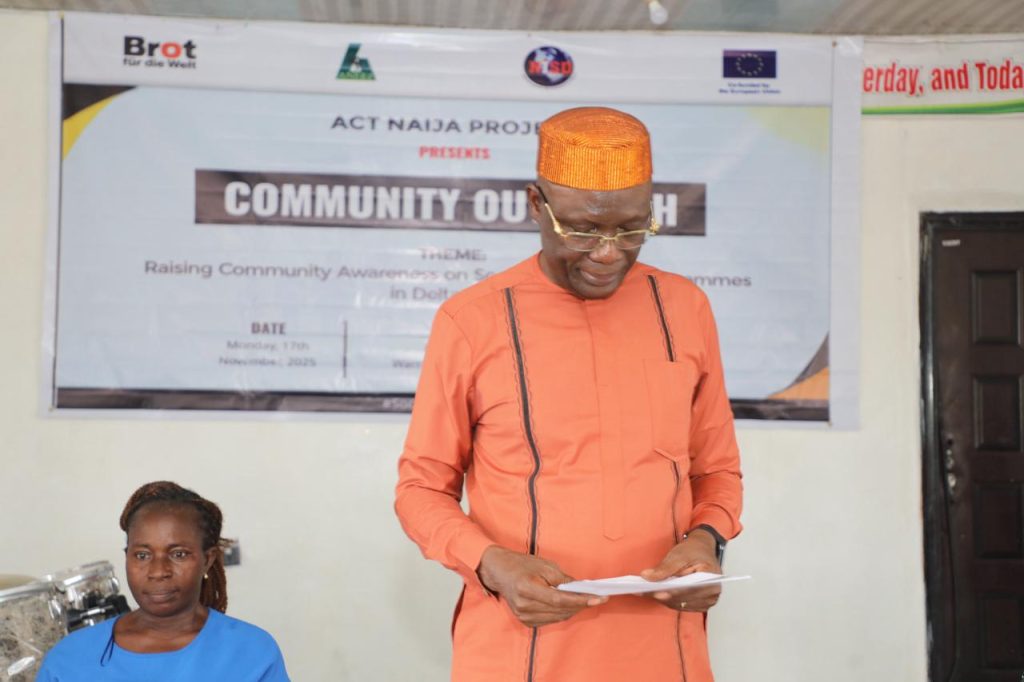Beneficiaries of the Conditional Cash Transfer (CCT) programme in Koko Community, Warri North Local Government Area, have passionately appealed to the Delta State Government and relevant authorities to sustain the monthly ₦5,000 support that has enabled them to keep their children in school and provide basic household needs.
The appeal came during a community outreach session convened today by the Africa Network for Environment and Economic Justice (ANEEJ), in collaboration with Bread for the World (Germany) and the New Initiative for Social Development (NISD), under the EU-co-funded ActNaija Project. The event focused on the theme: “Raising Community Awareness on Social Protection Programmes in Delta State.”
Speaking at the outreach, beneficiaries of the CCT programme described the intervention as a lifeline for poor households. One mother narrated how the monthly ₦5,000 cash transfer helped her pay her children’s school fees, keeping them in school despite difficult economic conditions. She appealed to the government to “please continue the payment so that families like ours can survive, and our children can remain in school.”

Other beneficiaries shared testimonies about joining cooperatives and saving part of their cash transfer to start micro-enterprises, including chair and table rental services. They emphasized that the CCT has helped them escape extreme poverty and build modest but sustainable means of livelihood. Their experiences reaffirm the transformative power of social protection programmes in enhancing financial inclusion, improving household welfare, and strengthening community resilience.
The Executive Director of ANEEJ, Rev. David Ugolor, represented by the Deputy Executive Director, Leo Atakpu, reiterated the importance of social protection in reducing vulnerability and ensuring equitable access to welfare programmes. He emphasized that although Delta State has introduced several interventions under the MORE Agenda such as Cash Transfers, GEST, AGILE, and Widows Welfare initiatives, many rural households remain unaware of these opportunities.
“This outreach aims to close that information gap,” Rev. Ugolor stated. “Social protection works. We have heard firsthand how it is keeping children in school and helping families rebuild their lives. Sustaining these programmes is essential in the fight against poverty.”
The outreach produced strong outcomes. Community members gained practical knowledge on how to access ongoing programmes, while the State Operations Coordinating Unit (SOCU) announced that a new round of Social Register enrollment will commence by the end of November. Residents were advised to prepare their NIN, BVN, and bank details, which are now mandatory for enrollment. SOCU also addressed grievances from residents who felt excluded from previous benefit cycles, explaining that mismatched BVN and account details often lead to disqualification, and encouraging residents to update their records.
ANEEJ noted that through the ActNaija Project, it is working across several states to strengthen social protection coordination, expand access to the National Social Register (NSR), and ensure that vulnerable citizens understand how to enroll and benefit from government programmes.
The organization expressed gratitude to the Delta State Government, the Warri North Local Government Authority, traditional leaders, women and youth groups, CSOs, and the media for their collaboration in promoting inclusive social protection delivery.
Rev. Ugolor reaffirmed ANEEJ’s commitment to ensuring that every family regardless of location has access to social protection systems that guarantee dignity, opportunity, and economic security.
The ActNaija Project is currently being implemented in Borno, Delta, Ekiti, Enugu, Ondo, Osun, Kogi, and the FCT.
For further information, please contact 08187674339 or info@aneej.org & follow us on twitter, Instagram &facebook: @aneejnigria, aneej__nigeria and facebook.com/aneejnigeria
